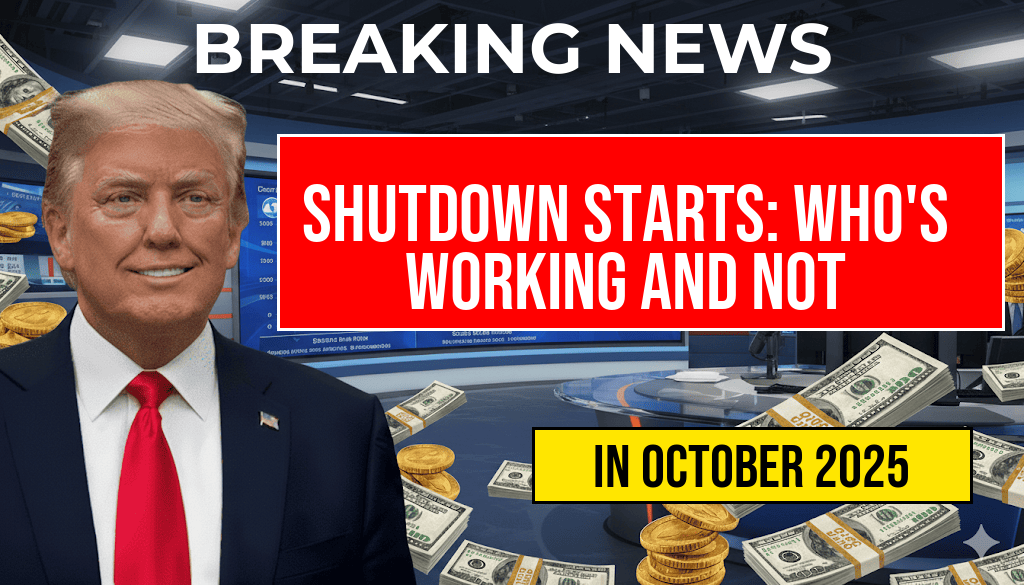The federal government has officially entered a shutdown after Congress failed to pass a funding measure before the midnight deadline. Thousands of government employees face furloughs, while essential services remain operational. Key agencies such as the Social Security Administration, the Internal Revenue Service (IRS), the Department of Defense, and the Transportation Security Administration (TSA) are affected in varying degrees. While some agencies have contingency plans that allow limited operations, others have halted most activities, impacting millions of Americans relying on government services. This shutdown follows weeks of political gridlock over budget negotiations and federal spending priorities, underscoring ongoing partisan divisions.
Impact on Federal Agencies: Who’s Staying Open and Who’s Not
As the shutdown takes effect, federal agencies are implementing different levels of operational adjustments based on their funding status and statutory mandates. Agencies with mandatory spending authority or independent funding sources continue functioning with minimal interruption, whereas those relying heavily on annual appropriations face significant disruptions.
Essential vs. Non-Essential Functions
- Essential services include national security, public safety, and critical health functions. These agencies maintain operations to protect citizens and uphold safety standards.
- Non-essential services are temporarily suspended, affecting administrative functions, public outreach, and certain grant programs.
Agency Breakdown: Who’s Working and Who’s Not
Social Security Administration (SSA)
The SSA continues to process benefits and handle critical customer service functions. However, most routine inquiries and administrative hearings are postponed due to staffing cuts. Social Security checks are scheduled to continue uninterrupted, but some related services may face delays.
Internal Revenue Service (IRS)
The IRS has scaled back operations significantly. While tax filing deadlines remain unchanged, many support services, audits, and correspondence processing are halted. Some taxpayer assistance centers are closed, complicating efforts for individuals needing in-person help.
Department of Defense (DoD)
National security remains a top priority, so active-duty military personnel and defense-related operations continue without interruption. However, civilian employees not designated as essential face furloughs, and many administrative functions are suspended.
Transportation Security Administration (TSA)
The TSA maintains staffing levels at airports across the country, ensuring the continuity of passenger screening. Security personnel are deemed essential, allowing air travel to proceed as usual despite the shutdown.
Other Agencies
| Agency | Operational Status | Notes |
|---|---|---|
| Environmental Protection Agency (EPA) | Partial | Most field operations halted; some emergency responses ongoing |
| National Institutes of Health (NIH) | Limited | Research activities paused; clinical trials continue where possible |
| U.S. Census Bureau | Paused | Data collection and surveys suspended until funding resumes |
Public Services and Federal Workforce
Public-facing services are significantly impacted, with many agencies halting non-essential functions. Citizens seeking assistance from federal offices or online portals may face delays or closures. Meanwhile, federal employees deemed non-essential are furloughed, disrupting operations across various departments. Essential personnel—such as law enforcement, border patrol, and emergency responders—continue to work without pay until funding is restored.
Furloughs and Pay
Most federal employees classified as non-essential are placed on unpaid leave. While some workers are expected to return to their roles once funding is secured, others face financial uncertainty during the shutdown period. Lawmakers are debating whether to pass legislation to guarantee back pay for affected workers, but no final decision has been made.
Impact on U.S. Economy and Public Confidence
The shutdown’s economic consequences are already visible, with markets reacting to uncertainty and delayed government spending. Small businesses relying on federal contracts face postponed payments, and public confidence in government stability diminishes as services slow or cease. The longer the shutdown persists, the more profound its ripple effects become, potentially disrupting economic growth and undermining public trust.
Looking Ahead: Negotiations and Potential Resolutions
Lawmakers are expected to resume negotiations in the coming days to resolve funding disagreements. The Biden administration has urged Congress to pass a clean funding measure to reopen the government fully. Meanwhile, some members of Congress are advocating for contingency plans to protect critical services and ensure the continuity of essential operations, regardless of political disputes.
For ongoing updates and detailed information on agency-specific impacts, visit whitehouse.gov and congress.gov.
Frequently Asked Questions
What agencies are affected by the government shutdown?
The government shutdown impacts various agencies, including Social Security, IRS, Defense, and TSA. While some agencies continue operations, others face partial or complete closures depending on funding and essential status.
Which government services will continue during the shutdown?
Essential services such as national security, air traffic control, and public safety typically remain operational. Agencies like Defense and TSA continue to function to ensure safety and security, while many others may have limited activity.
How does the shutdown affect Social Security and IRS services?
During the government shutdown, Social Security benefits are generally still processed and distributed, but some IRS services, including tax assistance and audits, may be temporarily unavailable or delayed.
Will there be any impact on federal employees and contractors?
Yes, many federal employees and contractors may face furloughs or work without pay until the funding is restored. Essential workers may continue to work, but non-essential staff might be sent home.
What are the potential long-term effects of the government shutdown?
The long-term effects could include delays in government operations, economic impact, and disruptions to public services. Prolonged shutdowns may also harm trust in government functioning and delay critical projects.

Leave a Reply